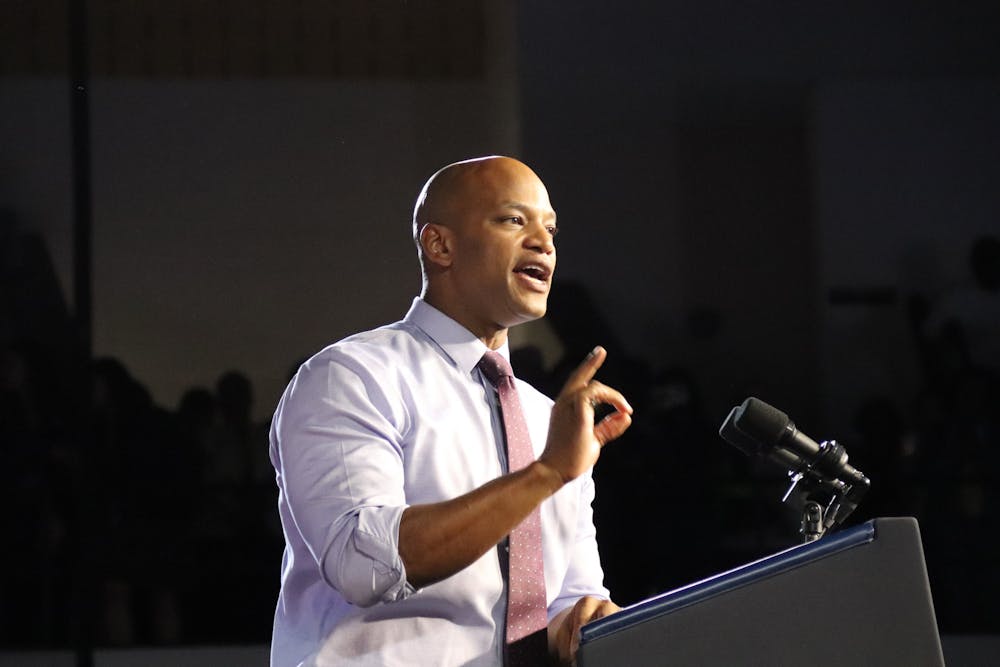Democrat Wes Moore, a Hopkins alum and former non-profit executive, was elected to be the 63rd governor of Maryland. Succeeding Governor Larry Hogan, Moore will be the first Black governor of Maryland and the third in the history of the United States.
Garnering upwards of 900,000 votes, Moore held a comfortable lead over his main opponent, Republican nominee Dan Cox. Moore ended the night with 59.8% of the reported vote, compared to Cox’s 37%.
Raymond Perez, co-president of Hopkins College Democrats, voiced the importance of Moore’s election in the present in an email to The News-Letter.
“The Maryland electorate sees through far-right politics, but also because it showcases that candidate quality matters,'' he wrote. “The energy of the Moore campaign was simply insurmountable for the incumbent Republican party, and their defeat is a rejection of the Maryland Republican smoke-and-mirrors that so often angles the party as ‘moderate.’”
As polls across Maryland closed and ballots continued to be counted, Moore declared his victory.
“It’s because you believed that I stand here humbled and ready to become the 63rd governor of the state of Maryland,” he said. “It was your support. Your sense of purpose that carried us across this state to all 24 jurisdictions from the western mountains to the eastern shore.”
Throughout the election cycle, Moore emerged from a tough Democratic primary for the party’s nomination, beating former U.S. Secretary of Labor Tom Perez by 2.3%. Moore was favored to win the general election after winning the nomination and outgoing Governor Hogan’s endorsed candidate Kelly Schulz failed to secure the Republican nomination.
Junior Zyan Baptiste, secretary of the Black Student Union, highlighted the significance of Moore’s election in an email to The News-Letter.
“Governor Moore winning this election was a big push for the future of minority representation in US politics,” he wrote. “It gives younger people part of these marginalized groups someone that looks like them in this position of power within the US political system.”
He noted that Moore’s election holds incredible importance as minority and marginalized groups work towards gaining adequate representation in government.
Moore’s platform called for an end to child poverty in Maryland and heavier state investment in public transit and clean energy projects. In his victory speech, Moore outlined the leading goals of his administration.
“We will make sure that we are keeping these illegal guns and violent offenders off of our streets. In our Maryland you will feel safe in your own neighborhoods and you will feel safe in your own skin,“ he said. “We will protect abortion rights and access and we will empower women to make decisions about their own reproductive health.”
Moore’s election is not the only history-making moment in Maryland from the 2022 midterm elections. Aruna Miller, a former member of the Maryland House of Delegates, is set to become the first Indian American to be elected as lieutenant governor in Maryland.
In an email to The News-Letter, Isabel Veloso, president of the Inter-Asian Council, described how Moore and Miller could improve relations between communities across Maryland.
“We hope that the partnership between Wes Moore and Aruna Miller can demonstrate how Black and Asian communities (and minorities in general) can work together for the common good,” she wrote. “We also hope that Aruna Miller, being an Indian-American immigrant, will mobilize APIDA Maryland citizens to become more politically engaged and feel more empowered to speak out.”
Baptiste also expressed his hopes for the Moore-Miller administration to provide a voice for marginalized groups on certain policies and governmental affairs regarding the University.
“I would like to see Wes Moore tackle issues pertaining to the Black community in Maryland, especially in Baltimore with his Alma Mater, and its relationship with the city,” he wrote. “The Governor can work with both the city and the university to fix that relationship or at the very least, better it for the community that Johns Hopkins resides in.”
Veloso cited specific policy areas she believes the Moore-Miller administration should prioritize.
“We hope to see increased governmental support for the growing immigrant population in Maryland (including working with community based organizations) and continued COVID resources and public health programs,” she wrote.
Yana Mulani contributed reporting to this article.





